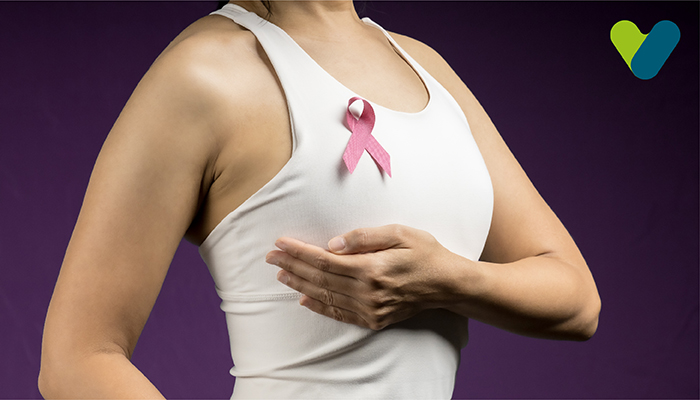Aliya has a family history of breast cancer. As she is getting older, she is more worried about her chances of getting breast cancer. To make sure that she doesn't have cancer, she researches the symptoms of breast cancer.
Aliya has experienced some of the symptoms that were listed in her research. She contacts her doctor immediately for a check-up. The vital information that she found out about the symptoms of breast cancer through her research is as follows:
What is breast cancer?
Breast cancer is a disease where cells in the breast grow and divide uncontrollably. Breast cancer can be of different kinds depending on which cells in the breast turn cancerous. The risk of breast cancer increases with age and weight gain.A breast is made up of three parts- lobules, ducts, and connective tissue. Lobules produce milk, the ducts carry milk to nipples and connective tissue surrounds the breasts and holds everything together. Ducts and lobules are the most common site of breast cancer. Breast cancer can also travel to other body parts and create new tumors, this process is known as metastasis.
Early Warning Signs of Breast Cancer
Early detection of cancer is vital in treatment and recovery. Here are some signs and changes that you can look for to detect the early stages of cancer:- Lump in breast or underarm: A lump in the breasts or underarms that doesn't go away is the most common symptom of breast cancer.
- Swelling in armpit or near collarbones: When cancer spreads to lymph nodes of the armpit or collarbone area, it can cause swelling. Swelling comes before lumps.
- Pain and tenderness: Lumps don't usually hurt but may have some pain and tenderness. Prickly feelings are also common.
- Indented or flat area on breasts: A tumor that you can't see or feel may result in a flat or indented area on your breast.
- Changes in Breasts: Changes in size, texture, contour, or temperature of the breast can be an early sign of breast cancer.
- Changes in nipples: Changes in nipples such as dimpled nipples, nipples pulled onwards, burns, itches, or developed sores on nipples could all be warning signs of breast cancer.
- Unusual nipple discharge: Nipple discharge that is clear, bloody, or another color.
- Breast area that feels different: A marble-like area under the skin that feels different from other parts of the breast.
Breast Cancer Types and Symptoms
Symptoms of ductal carcinoma :Ductal Carcinoma is the most common type of breast cancer. 1 in 5 new breast cancers is ductal carcinoma. In this type of cancer, the cells lining the ducts in the breast are cancerous. The symptoms of ductal carcinoma may not be noticeable, other symptoms include:
- Breast lump
- Bloody discharge.
Lobular carcinoma begins in the lobules, which are glands that create milk. The symptoms of the second most common cancer, include:
- Nipples that are flat or inverted.
- Thickening, swelling, or fullness in one region of the breast.
Symptoms of invasive breast cancer:
Invasive or infiltrating breast cancer spreads from its origin to its spreading tissues. Symptoms include:
- Lump in breast or armpit that you might not be able to move.
- One breast looks different from the other.
- Thick, red, dimpled skin or a rash.
- Skin sores.
- Swelling in breasts.
- Small, hard lymph nodes that may be stuck to each other or stuck to the skin.
- Pain in one spot.
Symptoms of metastatic breast cancer:
Metastatic or secondary breast cancer is cancer that can spread to other body parts, including other organs. Symptoms vary based on where the cancer is, including:
- Headache.
- Trouble breathing.
- Bone pain.
- Belly swelling.
- Changes in brain function.
- Double vision.
- Yellow eyes or skin.
- Nausea.
- Weight loss and loss of appetite.
- Weakness.
Symptoms of triple-negative breast cancer:
Triple-negative breast cancer doesn't have receptors for the hormones estrogen and progesterone and a protein called HER2. This cancer grows and spreads faster than other cancers. The symptoms include:
- Breast pain.
- Lump or mass in the breast.
- Nipples turn inwards or have discharge.
Symptoms of inflammatory breast cancer (IBC)
Inflammatory breast cancer is a rare cancer type, the symptoms are:
- Warm, swollen, and red-colored breast.
- Dimpled, leathery, or ridged skin.
- Inwards turned nipples.
Symptoms of papillary carcinoma
A rare type of ductal cancer named for tiny lumps, or papules, on the tumor. The symptoms include:
- A cyst that is small and hard.
- Bloody nipple discharge.
Symptoms of angiosarcoma
Less than 2% of breast cancers are angiosarcomas. Angiosarcoma originates in the cells lining blood vessels or lymph nodes. The symptoms caused are:
- Breast lump.
- Purple bruised looking skin.
- Pain in one area.
- When scratched or bumped the skin bleeds easily.
Symptoms of male breast cancer
Male breast is a rare form of cancer that forms in the breast tissue of men. Though men of any age can get breast cancer however it is more common in older men. The symptoms of this cancer are:
- A lump or thick spot in the breast or armpit.
- Changes in breast skin or nipple, like redness, scales, puckering, or discharge.
- Discharge from nipples.
Conclusion
According to the WHO, breast cancer is the most common cancer in women. The best way to fight this cancer is early detection. Like any other cancer, early detection and treatment contribute the most in determining the outcome. If detected in the early stages, breast cancer is curable and easily treated. If you are concerned about experiencing any of the symptoms mentioned in this article talk with your doctor and schedule regular mammograms.


